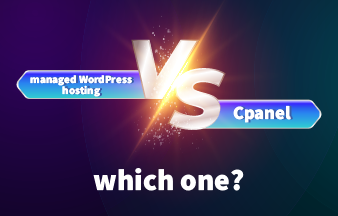
There are two main types of hosting: managed WordPress hosting and Cpanel hosting. Both have their advantages and disadvantages, but which one is right for you, cPanel vs WordPress hosting?
cPanel vs WordPress
Managed WordPress Hosting
Managed WordPress hosting is probably the most common type of website hosting out there. This is because it’s a great option for beginner users who don’t want to spend time learning about servers and other technical stuff.
Here’s what you need to know about managed WordPress hosting:
- The provider handles all the technical details, such as security updates and server maintenance. You just need to focus on your site’s content and design.
- You don’t have access to any control panels or command lines—everything is done through an online control panel provided by your host.
- Usually, managed WordPress hosts provide excellent 24/7 customer support to help you with any problems you might encounter while using their services.
cPanel
cPanel is a web-based control panel that allows you to manage your website from a single location. It offers an intuitive interface with dozens of different tools for managing your website’s files, databases, and email accounts.
While some hosts offer their own control panels, most don’t provide full access to cPanel. Instead, they offer an alternative interface for managing your website.
For example, DreamHost offers its own host cPanel (DreamPress), while HostGator offers HostCPanel. Both of these interfaces can be used instead of cPanel, but they don’t provide the same level of functionality or convenience as cPanel itself.
Why Would You Need cPanel?
If you want full control over the way your site looks and functions, then using a web host that doesn’t offer cPanel isn’t going to cut it. This is especially true if you’re running an e-commerce site or if you’re planning on launching multiple
What are the Pros and Cons of Managed WordPress Hosting and cPanel?
Managed WordPress hosting and Cpanel are both powerful tools that can help you manage your website. The biggest difference between the two is that managed WordPress hosting is designed for WordPress, while cPanel is a general-purpose control panel.
Managed WordPress Hosting
Pros of Managed WordPress Hosting
Managed WordPress hosts offer lots of features designed specifically for WordPress. These include:
- Managed hosts will usually offer some kind of security measure, such as firewall protection or malware scanning. They will also back up your site automatically so that if something goes wrong, you don’t lose all your data.
- Managed hosts will optimize your site’s performance so that it loads quickly and smoothly on all devices. They may also be able to improve the speed at which your site responds to visitors by caching content on their servers before sending it to visitors’ browsers (this is known as “server-side caching”).
- Most managed hosts offer basic analytics tools like Google Analytics, but some also have more advanced tracking tools like Piwik, which gives you more insight into what people do on your site so you can improve it accordingly.
- It allows you to focus on growing your business through your website instead of worrying about technical issues.
Cons of Managed WordPress Hosting:
- Limited customization options mean there may be things you can’t do yourself.
cPanel
Pros of cPanel?
- The interface is very intuitive and easy to use, and you don’t need any technical knowledge to use it. You can easily create new email accounts, add subdomains, and perform other tasks with just a few clicks.
- You can easily customize your cPanel settings by installing additional plugins or themes without having to access the server directly.
- cPanel comes with a built-in security feature called Security Center, which enables users to disable commonly exploited scripts on their websites, such as WordPress and Joomla CMSes or PHPMyAdmin, which can be targeted by hackers for malicious activities like DDoS attacks on your website or database hacking attempts.
- cPanel allows users to easily scale their hosting services as their business grows by adding more resources when needed or simply upgrading their current plan without having to move their account onto another server altogether.
Cons of cPanel:
- Can be slow or laggy on some shared hosting environments.
- Costs extra for a license, which can add up for multiple sites.
- The interface can feel cluttered and overwhelming for beginners.
- Security can be an issue if you don’t keep it regularly updated.
- Resource-heavy, which can affect server performance on lower-end hosting plans.
In the end, the choice between managed WordPress hosting and cPanel comes down to your needs.
If you want something hassle-free with automatic updates, backups, and built-in support, managed WordPress hosting is probably the better pick. But if you prefer more control over your server, flexibility for different sites, and don’t mind a bit of extra work, cPanel gives you that freedom.
It’s all about what fits your workflow and comfort level.





